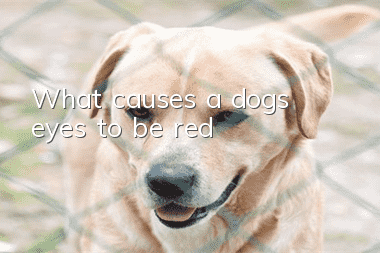Does a dog have a nosebleed because he is angry? In fact, it is a sign of serious illness. If the owner does not deal with it in time, it will harm the dog.

Nosebleeds in dogs seem to be uncommon, but once they occur, the cause is not as simple as getting angry. A sudden nosebleed in a dog means that his nose or respiratory tract has been seriously injured, which may even be fatal in severe cases. Previously, a netizen's 2-year-old Chow Chow suddenly suffered a nosebleed and went into shock soon after. After examination, it was discovered that the dog suffered from a ruptured malignant splenic blood vessel tumor, and the dog could not be saved in the end. But the reasons for dog nosebleeds are not limited to this. If a dog suddenly has a nosebleed, what should the owner do?
1. Why do dogs have nosebleeds?
The most common causes of sudden nosebleeds in dogs are nose trauma, ruptured nasal mucosa, and upper respiratory tract infection. If the dog's nose has been impacted recently, such as a fall, a car accident, or the dog's nasal cavity is inflamed due to chronic infection, you may see bleeding from one nostril. In rare cases, bleeding may occur if foreign objects enter the dog's nasal cavity, such as grass, plant seeds, etc. Dogs like to use their noses to smell any new environment, but if there are toxic substances like rodenticide, the dog is likely to inhale it into the nose, and nosebleeds are one of the signs of poisoning.
If your dog has nosebleeds for a long time, it may be caused by high blood pressure, dental disease, fungal infection in the nose, tumors in the nose, coagulation disorder, imbalance of blood protein levels, and parasitic infection. Dogs with dental disease or nose tumors will bleed from only one nostril, while coagulation disorders or fungal infections will bleed from both nostrils. Finally, nosebleeds may also be caused by congenital coagulopathy or autoimmune disease, but these diseases are relatively rare, and Doberman Pinschers are the dog breed with the highest incidence of congenital coagulopathy. If the owner is unable to make his or her own judgment, the final step is to consult a pet doctor.
2. What should an owner do if his dog has a nosebleed?
If the dog continues to have a nosebleed, the owner should first try to calm the dog down. Some external stimuli may increase your dog's blood pressure, causing his nose to bleed. If the dog doesn't resist, you can place a wipe or ice pack on the dog's nose. However, for dogs with short nasal cavities such as pugs and bulldogs, owners should be careful not to cover the dog’s nostrils with wet wipes or ice packs to prevent them from breathing difficulties. The cold temperature of wet wipes and ice packs can constrict the blood vessels in your dog's nose, slowing nosebleeds. After the bleeding is stopped, it is best for the owner to take the dog to the pet hospital for diagnosis immediately to understand the cause of the dog’s nosebleed and prescribe appropriate medicine. The owner can first think about whether the dog has suffered any trauma or disease in the past, and whether it has taken any medicine recently, and sort it out to the pet doctor, which allows them to screen for the cause of the disease.
3. How to treat nosebleeds in dogs?
How to treat nosebleeds in dogsChanges depending on the cause of the disease. If the dog is infected by fungus or bacteria, the dog will need to take antifungal drugs or antibiotics. Although these treatments require long-term treatment, they are not difficult. However, if the tooth is infected, surgery may be required to remove the tooth in question. Not only that, the treatment of nose tumors, coagulopathy, hypertension, abnormal blood protein, and parasitic infections will be more complicated and long-term. Generally speaking, nosebleeds caused by dental infections or bacterial and fungal infections can be cured, as long as the owner takes the dog to the pet hospital for treatment in time. When a dog eats poisonous substances such as rodenticide, even if it is treated in time, it may suffer from repeated adverse symptoms in the future. What's more serious is that regardless of whether the tumor in the nose is benign or not, it may develop to the point where it cannot be treated.
In life, the most common cause of nose bleeding in dogs may be nose trauma. Dogs will run around when they get excited. If they accidentally hit walls, tables, chairs and other hard objects, they may bleed in a minute. nosebleed. At this time, it is best for the owner to comfort the dog and give it a cold compress in time, and then take it to the pet hospital for treatment. However, if the dog has a nosebleed for no reason, the owner should be careful of the dog's physical abnormalities and seek help from a pet doctor after trying to stop the bleeding.
References:
1. Lung M A, Wang J C. An anatomical investigation of the nasal venous vascular bed in the dog[J]. Journal of anatomy, 1989, 166: 113.
2. Harcourt‐Brown N. Rhinoscopy in the dog 1. Anatomy and techniques[J]. In practice, 2006, 28(4): 170-175.
- Ten rules for properly raising dogs
- The Importance of Checking Your Dog’s Anal Glands
- How to keep an adult shepherd dog in good obedient habits, shepherd dog training!
- How to train a young Bichon Frize? Tips on training a 2-month-old Bichon Frize!
- Popular dogs may not be suitable for you to keep! Take stock of the pros and cons of popular dog breeds
- How to tell if a puppy has been vaccinated?
- How to correct a dog eating poop
- Why does the dog keep spinning in circles?
- Causes of third eyelid hyperplasia in dogs
- How to train an Australian Shepherd?



